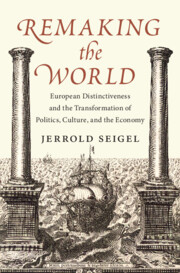 Remaking the World
Remaking the World Book contents
- Remaking the World
- Remaking the World
- Copyright page
- Contents
- Figures
- Acknowledgments
- 1 Introduction
- Part I Liberty and Liberties
- Part II Autonomy and Teleocracy
- 5 Spaces of Autonomy
- 6 Classical Humanism and Aesthetics
- 7 Science as a Sphere of Autonomy
- 8 Teleocratic Sciences
- Part III Openness and Domination
- Part IV Making Industry Modern
- Notes
- Index
5 - Spaces of Autonomy
The Church, Universities, and the Bounds of Reason
from Part II - Autonomy and Teleocracy
Published online by Cambridge University Press: 29 November 2024
- Remaking the World
- Remaking the World
- Copyright page
- Contents
- Figures
- Acknowledgments
- 1 Introduction
- Part I Liberty and Liberties
- Part II Autonomy and Teleocracy
- 5 Spaces of Autonomy
- 6 Classical Humanism and Aesthetics
- 7 Science as a Sphere of Autonomy
- 8 Teleocratic Sciences
- Part III Openness and Domination
- Part IV Making Industry Modern
- Notes
- Index
Summary
The Church’s victory in the “Investiture Controversy,” throwing off the domination achieved over it by secular powers following the death of Charlemagne, made it the first domain to successfully assert the right to manage its activities in accord with its own principles. But victory was only partial, leaving spiritual and secular powers facing each other across a field of constantly shifting relationships, giving heterodoxy more room to survive than elsewhere. An early example was the contrast between European universities, established as associations of teachers and students formed to assert autonomy from town authorities, and Islamic madrasas subject to direction by their elite patrons. When the corpus of Aristotelian texts became available, first in Arabic and later in Latin, it was first greeted with enthusiasm by readers of both, followed by suspicion because Greek materialism posed threats to religious doctrines. In Muslim lands, this led to a widespread rejection of philosophical inquiry as a path to truth; in Europe, attempts to impose similar restrictions failed, because university faculties resisted the claims of churchly conservatives to limit what could be taught. In this situation, scholastic speculation generated radical ideas about cosmology and physics, foreshadowing the break with traditional cosmology two centuries later.
Keywords
- Type
- Chapter
- Information
- Remaking the WorldEuropean Distinctiveness and the Transformation of Politics, Culture, and the Economy, pp. 95 - 110Publisher: Cambridge University PressPrint publication year: 2024
